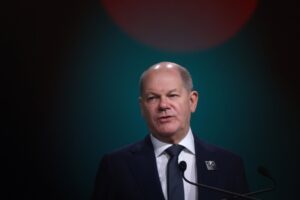Brussels (10/8 – 20). Fresh off the back of a resounding election victory last month, Emmanuel Macron has pitched one the biggest changes to the structure of the European Union in decades.
What is Macron’s idea?
Amid his own suggestions that war-torn Ukraine’s EU membership bid could take “decades” and long delays to the accession of countries in the Western Balkans, France’s president wants consideration given to a two-speed Europe.
He laid out his vision of a broader community of European democracies that would allow for deeper cooperation between the 27-member bloc and non-EU countries.
Within this new political union, nations like Ukraine, and even a post-Brexit Britain, could forge deeper ties without officially joining the EU.
“The EU, given the level of its integration and ambition, cannot be in the short-term the only means of structuring the European continent,” Macron told MEPs.
“It’s our historic obligation to respond to that today and to create what I would call a ‘European political community’. This new European organisation would allow European democratic nations adhering to our core values to find a new space for cooperation on politics, security, energy, transport, infrastructure investments and the movement of people, especially the young.”
Why now?
Macron made the comments on Monday at the Conference on the Future of Europe, a consultation exercise on how the EU should be reformed.
Symbolically, he spoke on Europe Day, an occasion that honours the starting point of the continent’s political and economic integration.
His words also come amid Russia’s war in Ukraine, which has sparked Kyiv and two former Soviet countries to submit hasty EU membership applications: Moldova and Georgia.
In addition, there are rumblings from the Western Balkans where countries such as North Macedonia and Albania have long been waiting for membership talks to start.
It may also be linked to frustrations at the speed of EU decision making. Several countries, including Hungary, are holding up a Brussels bid to ban imports of Russian oil.
How would Macron’s idea work?
Details are still very sketchy.
Macron, speaking later alongside German chancellor Olaf Scholz, said: “We must find a political form that enables to ‘dock’ to Europe some states that share the same values and geography and to build together a political coordination, probably some forms of solidarity in terms of security — and which are not the same as NATO, but some elements of cooperation, solidarity to be defined — cooperation in terms of energy because we see the integration and solidarity within Europe about these energy issues which are so structuring.
“We must now start the political consultation to see the interest and, as you noticed, maybe it’s also a way to regain stability and another form of cooperation with some countries such as the United Kingdom which has decided to leave our European Union but which can have its rightful place in this political community.”
Nevertheless, the idea marks a major shift in the direction of European policy, particularly for France, which has shown a degree of intransigence towards further integration of new EU member states for years now.
Macron’s plans would see a two-tier Europe, which, in many ways, runs contrary to the idea of the EU, that is, complete allegiance to the bloc’s laws and regulations, and in the case of this new proposal, loosely attached European governments which would only cooperate more deeply on issues, such as defence and taxation.
“One can say the Schengen Area and the eurozone are examples of a two-speed Europe, which is not the same as the other idea [of Macron], which is this outer circle of non-members of the EU, which would cooperate with the European Union on specific areas without being part of the bloc as members of the institutions,” Camino Mortera-Martinez, head of the Brussels office at the Centre for European Reform told Euronews.
“And that’s what I think Macron mentioned or was referring to, this idea of the European political community. And that’s what applies to Ukraine, Georgia, Moldova, and perhaps to the UK, as well as other countries.”
Who is waiting to join the European Union?
Ukraine, Georgia and Moldova have all submitted applications since Russia’s war began on 24 February.
The European Union’s executive arm, the European Commission, said it aims to deliver a first opinion in June on Ukraine’s request to become a member.
Macron said Ukraine’s aspiration to join the bloc was “legitimate”, saying Kyiv’s desire, as well as Georgia and Moldova’s, “allows us to re-evaluate our geography and the organisation of our continent”.
But, behind closed doors, many member states accept that fast-track membership for Ukraine — and other candidates — is highly unlikely given that a proposal like this would require major changes to the EU treaties.
“Lots of these [EU] governments are very wary of opening the treaties because they know that’s like opening Pandora’s box,” Mortera-Martinez said. “Everybody’s going to have a requirement and advise them to have a wish list, and that’s going to become quite difficult at the moment.”
Critics point to Macron just trying to appease non-EU countries waiting in the wings, some of whom have been in the candidacy queue for years now, rather than actually seriously considering their membership bids.
Apart from Turkey — with whom talks began in 2005 but which stalled and were then stopped in 2019 — and the trio of recent applicants, all those waiting to join are based in the Western Balkans.
North Macedonia, which first applied in 2004, has met the criteria for beginning membership talks but its bid is being held up by a dispute with Bulgaria.
Albania’s bid is linked to North Macedonia’s, so Sofia’s veto is holding things up for Tirana, too.
Montenegro applied for EU membership in 2008. Accession talks, which began in 2012, are advanced and the country could be ready to join by 2025.
Talks are also ongoing with Serbia, while Kosovo and Bosnia and Herzegovina are considered “potential candidates for EU membership”.
Kosovo, a former province of Serbia, declared independence from Belgrade in 2008. Serbia doesn’t recognise this and continues to treat Kosovo as if it were under its sovereignty. Brussels says neither will be able to join the EU until this dispute is resolved.
Prospects for Bosnia, meanwhile, are poor. It applied for EU membership in 2016 but, according to a European Parliament briefing note, “internal political instability and lack of political reforms have dampened the country’s prospects of joining the EU”.
What are the chances of Macron’s idea becoming a reality?
Macron’s idea would likely require changes to the EU treaties and there appears to be little appetite for this.
Up to 13 countries, including Denmark, Slovenia, Bulgaria and Sweden, signed a document on Monday rejecting the idea.
“We do not support unconsidered and premature attempts to launch a process toward treaty change,” they wrote.
German Chancellor Olaf Scholz, although expressing interest in Macron’s proposal, also warned against disappointing long-time EU candidates.
“What is clear is, that this must not and will not stop us from moving forward with what we have started, namely enabling the accession processes that we have been working on for so long now,” Scholz said at a joint press conference with the French president in Berlin on Monday.
“This is especially true for the Western Balkans, which we have already talked about. There are very many of them who have already made very far-reaching preparations, who have also made brave decisions. And this courage must also be rewarded at some point.
“I would simply like to illustrate this with the example of North Macedonia. There have been very brave political leaders who have dared to do something to make it possible for the accession process to be able to start. And we should find a way that this bravery isn’t disappointed.”
President Macron says he would like to discuss the idea at the European Council summit in June, with the aim of getting the ball rolling for an EU convention on treaty change in the near future.
But with so many opponents already making their voices heard any significant amendments to the way the bloc works may be years off still.









